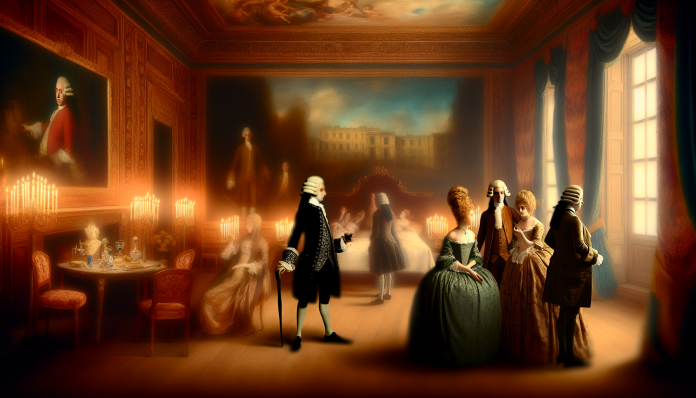Introduction
The late 19th and early 20th centuries were a time of rapid change in the world, marked by colonial expansion, burgeoning industrialization, and radical shifts in societal norms. At the center of this turbulent era was King Leopold II of Belgium, a monarch whose exploits in the Congo are infamous for their brutal colonial practices and staggering human rights violations. However, hidden beneath this dark legacy lies a web of scandalous affairs that unveils the intersection of power, sex, and moral decay.
As we delve into the life and legacy of Leopold II, we will explore not only his exploitative reign over the Congo but also his notorious romantic entanglements that scandalized Europe. This article will shed light on the societal norms of his time and juxtapose them with contemporary moral values, revealing much about our evolving perceptions of power and sexuality.
The Scandal
Colonial Exploits: A Prelude to Scandal
King Leopold II’s rule over the Congo Free State, which he claimed as his personal possession from 1885 to 1908, is one of the most notorious chapters in colonial history. Under his absolute authority, the extraction of rubber and ivory turned into a nightmare of forced labor, violence, and death. Estimates suggest that millions of Congolese suffered atrocities during this period, with a lasting impact on the region that reverberates even today.
Yet, while Leopold’s colonial crimes dominated headlines, his personal life was equally scandalous. The king was known for his numerous affairs, particularly with women of interest in the society of his time. His relationships often mirrored the same exploitative nature that characterized his rule in the Congo.
Scandalous Affairs
Leopold’s most notable romantic involvement was with the Belgian actress, Léontine de L’Arbre. Their passionate affair, conducted in secrecy, captured the attention of society, and was often frowned upon due to Leopold’s marital status. The media of the time reported not only on the romantic escapades between the two but also on the extravagant gifts Leopold bestowed upon her, including lavish trips and luxurious jewelry. Such behavior was at odds with the conservative values of the era, where public figures were often held to stringent moral standards.
Public reaction was a mixed bag. While some scandalized citizens disapproved of the king’s acts of infidelity, others were drawn to the drama it presented. Satirical songs and cartoons began to emerge, mocking the king’s romantic entanglements, but the overall impact was muted compared to the glaring abuses occurring overseas in the Congo.
Moral and Cultural Analysis
Societal Reactions at the Time
At the turn of the century, European society was caught in a complex interplay of traditional morals and emerging liberal values. The Victorian era had left a deep imprint on sexual politics, emphasizing restraint and propriety, particularly among the elite. Scandals involving powerful men like Leopold were met with a particular type of scrutiny—public outrage but also a sort of morbid fascination. Affairs were often dismissed as a reflection of robust masculinity, while women involved frequently faced derision and moral blame.
Despite his indiscretions, Leopold’s position maintained enough prestige that he largely escaped severe public consequence for his actions. Critics of the king’s morality were often outshined by the pomp and grandeur he commanded, as the monarchy defended Leopold’s personal conduct as reflecting a man of his station.
Modern Perspectives
Fast forward to today, and the landscape surrounding affairs and power dynamics has undergone a seismic shift. In contemporary society, Robin DiAngelo’s concept of “white fragility” can be seen as applicable to both the imperialistic and patriarchal structures of the past. In the modern world, sexual scandals involving figures of authority often spark intense public scrutiny and immediate backlash.
If King Leopold II were subjected to the same standards today, his dual legacy of colonial exploitation and sexual scandal would not only condemn him in public discourse but could also potentially lead to calls for accountability that demand reparation and acknowledgment of the trauma inflicted upon the Congo. Modern audiences are less inclined to overlook personal failings of public figures, especially when coupled with oppressive historical actions.
Conclusion
The exploits of King Leopold II illuminate the transformative journey of societal attitudes toward sex, power, and morality across the centuries. His reign is a haunting lesson of how those in power can exploit both people and societal values, ultimately revealing the darker side of human nature.
As we reflect on this scandal, we are reminded of the essential questions of accountability and morality that persist in today’s world. The intermingling of personal and political issues continues to be relevant, prompting us to critically analyze the implications of power dynamics in relationships and the broader societal landscape.
In an age where voices demanding accountability grow louder, it is vital to remember that the past informs our present. The case of Leopold II serves not just as a cautionary tale but as encouragement for modern audiences to maintain a critical eye on history, understanding its influences on current values and behaviors, thereby contributing to a more nuanced discourse around power, sexuality, and ethical leadership.

